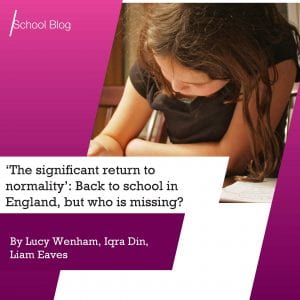 Blog post by Lucy Wenham, University of Bristol Iqra Din, School of Education, University of Bristol Liam Eaves, School of Education, University of Bristol
Blog post by Lucy Wenham, University of Bristol Iqra Din, School of Education, University of Bristol Liam Eaves, School of Education, University of Bristol
As part of the gradual lifting of lockdown measures in England, following the ‘second wave’ of the Covid-19 pandemic here, schools reopened wholesale on the 8 March 2021. For many parents and their children, the return to a semblance of educational normality is accompanied by a sigh of relief.
Our research (EBI, 2020), which is currently exploring the experience of 65 families resisting the return to school and is drawn from reflective surveys and interviews, indicates that this sense of relief is far from universal. Indeed, for some parents, the expectation that all children will return to school is not only unwelcome, it also brings deep unease, pressure and worry. Over 1 billion students have been out of school as a result of similar national school closures across 134 countries over the past year (UNICEF, 2020). As schools reopen, similar concerns are likely to resonate across the globe.
Protecting the clinically vulnerable
We found that those resisting the return to school can be split into three categories.
- Roughly half of those keeping children off school were doing so to protect clinically vulnerable (CV) or clinically extremely vulnerable (CEV) family members (‘My youngest child is CEV and I’m CV’).
- A further quarter had health concerns but no CV status (‘My little one had collapsed lungs two years ago’).
- The remainder kept their children home due to Covid-related anxiety (‘I don’t feel safe letting my six-year-old son mix with so many children every day’).
With the much-lauded vaccination rollout (Landler & Mueller, 2021), many CV adults have received their first dose of a vaccine. Arguably, then, the plight of these families is a diminishing concern. Yet such thinking is naïve. Amongst CV individuals, there remain some whose conditions mean they cannot be vaccinated. And what about CV children? With no vaccine licensed for children, such families remain exposed and rightly concerned (Ryan, 2021).
Difficult decisions
Parents’ experiences of school support during the pandemic have been polarised, and this will continue as schools reopen. Some parents have praised teachers for their continuing help and for respecting their decision to keep their children home. One parent states, ‘My son’s head[teacher] has been totally supportive and not pressured us at all… They couldn’t have offered any more than they have’. In contrast, other groups of parents have stated that they feel schools have focused aggressively on ensuring that all children return. With parents and schools facing difficult decisions, some school administrations have resorted to serving notices of absences remaining unauthorised, of fines or of deregistration. While some parents remain undeterred by such threats, declaring that they would rather face sanctions than risk their family’s safety, others express mounting anxiety or succumb to the pressure. One parent describes feeling left with no other choice but to send their child in, saying, ‘We reluctantly sent our child back to school… due to the threat of fines and having to lose a school place’.
While considering whether to comply with or resist the return to in-person schooling, several parents emphasised that their children’s happiness and wellbeing had improved while they were schooled at home. A significant minority among those who noted that their children were flourishing at home were the parents of children who have special educational needs or are on the autism spectrum.
‘I am able to help my child with home learning, and actually he was doing much better. He has additional needs… his mental health is better out of school’.
There are also instances of parents making the leap to permanent home-schooling, with no animosity towards their school. One such parent describes deregistering as ‘something we had considered pre-Covid’, yet not felt driven to do until now. Indeed, the experience of enforced home-schooling gave parents a taster of this alternative educational setup – albeit under atypical circumstances – and some were spurred into making a change, viewing this as the right decision for their family.
‘Remote learning for a year, and seeing how much happier and better they are doing with their work at home, has made me realise that I am capable and this is what’s best for them.’
This begs the question, what is it about our current education system that means some children are better off outside it? We must learn all we can from these extraordinary times and, instead of returning to education as normal, think seriously about critical pedagogical alternatives, in order to create a better education system for all (Macrine, 2020; Sosa-Provencio et al., 2020).
This work is supported by the Elizabeth Blackwell Institute, University of Bristol, with funding from the Quality-Related (QR) Strategic Priorities Fund, UKRI Research England.
References
Elizabeth Blackwell Institute for Health Research [EBI], University of Bristol (2020). ‘Impacts on school students’ mental health, in light of the Covid-19 pandemic’. COVID-19 ethics and social science research projects. [Webpage]. http://www.bristol.ac.uk/blackwell/health-research/covid-19-research/ethics-and-social-science/
Landler, M., & Mueller, B. (2021, March 1). Vaccine rollout gives U.K. a rare win in the pandemic. New York Times. https://www.nytimes.com/2021/01/29/world/europe/covid-vaccine-uk.html
Macrine, S. L. (Ed.) (2020) Critical pedagogy in uncertain times: Hope and possibilities. Springer Nature.
Ryan, F. (2021, February 28th) Vulnerable children ‘forgotten’ in Covid vaccine rollout, say UK charities. Guardian. https://www.theguardian.com/society/2021/feb/28/vulnerable-children-forgotten-in-covid-vaccine-rollout-say-uk-charities
Sosa-Provencio, M. A., Sheahan, A., Desai, S., & Secatero, S. (2020). Tenets of body-soul rooted pedagogy: Teaching for critical consciousness, nourished resistance, and healing. Critical Studies in Education, 61(3), 345–362.
Unicef (2020) What will a return to school during COVID-19 look like? https://www.unicef.org/coronavirus/what-will-return-school-during-covid-19-pandemic-look
Article originally published on the BERA blog: ‘The significant return to normality’: Back to school in England, but who is missing? | BERA
Authors



